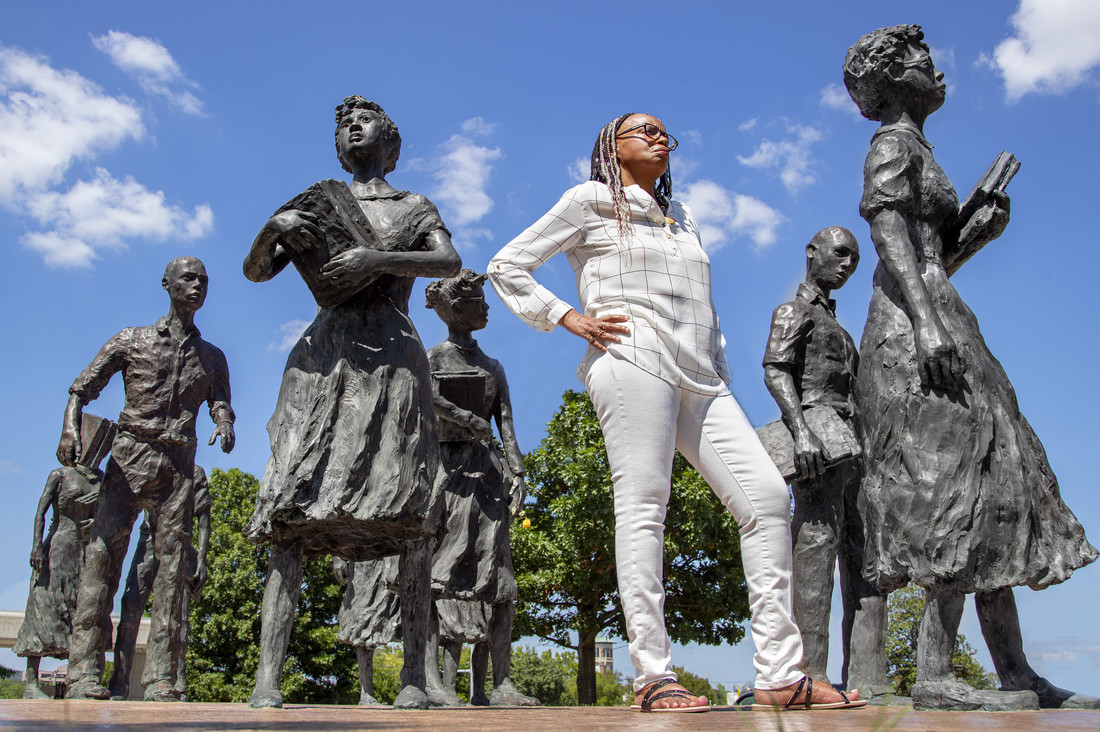Tell-Hall receives Little Rock Nine Endowed Scholarship
A University of Arkansas at Little Rock student with a passion for history has received a $5,000 scholarship from the Department of History for her inspirational civil rights research.
Nancy Tell-Hall, a graduate student in public history, received the department’s Little Rock Nine Endowed Scholarship, which is awarded to a graduate student focused on race relations and community development.
“It took me a very long time to return to school, so I greatly appreciate this scholarship,” Tell-Hall said. “I am humbled by it. I have worked very hard. However, I enjoy studying history so I don’t consider it work.”
Tell-Hall dropped out of college as a single parent in 1979. She left college to concentrate on raising her son, who graduated from UA Little Rock in 2017. After three additional children, and earning her associate degree in 2014, Tell-Hall joined UA Little Rock and achieved her ultimate goal of earning a bachelor’s degree in history in 2017.
“Nancy is a departmental stalwart, and she exemplifies the great students of UA Little Rock History,” said Dr. Jess Porter, chair of the Department of History. “Nancy has made herself a part of the departmental fabric from her participation and leadership in our honor society, Phi Alpha Theta, to her service learning research in association with Dr. Brian Mitchell.”
Tell-Hall recalls something a professor told her that inspired her to pursue a master’s degree in public history. His words opened opportunities for her to investigate the histories of marginalized people.
“When I came back to school, I decided to do something I always wanted to do, which was to study history,” Tell-Hall said. “In class, Dr. Carl Moneyhon said that history had been written by certain people and that certain people’s narratives weren’t a part of America’s public record. It just made sense to me. My mother’s family had a rich oral history. I knew my great-grandmother was 15 when the Emancipation Proclamation was enacted. We knew nothing of my father’s history. I found out from my mother he possibly had Native American blood. It took me six years of research to confirm it, and in 2012, I became a citizen of the Muscogee (Creek) Nation.”
While at UA Little Rock, Tell-Hall has worked as a graduate assistant with the Anderson Institute on Race and Ethnicity, interned with the City of Little Rock Planning and Development Department and the Sequoyah National Research Center, and volunteered with the National Register of Historic Places. Porter said that her list of accolades and hard work made her a perfect choice for the scholarship.
“Her smiling face is always a welcome sight in the halls of the department. The Little Rock Nine Endowed Scholarship is a fitting honor for Nancy to receive,” Porter said. “Her research and career goals align with the mission of the scholarship to improve race relations and enhance community development. We look forward to watching Ms. Tell-Hall positively impact the Little Rock community.”
Tell-Hall plans to graduate in December. She is spending the semester completing her thesis, “PROJECT ARK-4: Urban Renewal, Forced Relocation, and Possible Reparations: The Demise of West Rock, Arkansas, 1884–1960.”
West Rock, located in what is presently known as the Riverdale area, eventually became a vibrant all African-American community that provided affordable housing and accessibility to many domestic, service, and labor jobs located in the nearby Pulaski Heights neighborhood.
“The Little Rock Housing Authority and city leaders had all of them removed by 1960,” Tell-Hall said. “The plan to remove West Rock started in 1926 because the city needed to open the westward corridor, and they knew the property would be very valuable one day.”
In the new year, Tell-Hall and her husband, Jeffrey, of 37 years plan to move to Okmulgee, Oklahoma, the capital of the Muscogee (Creek) Nation. There, she plans to put her history research skills to work at the historic Creek Council House Museum which was the capital of the Nation from 1878 through 1907.
“I’m living the dream at 58,” Tell-Hall said. “My husband and I have 14 grandchildren, and the thought of building a home with lots of land where they can all run around is exciting. My plan is to travel around the country and to get some of our artifacts back for the Muscogee Nation.”
